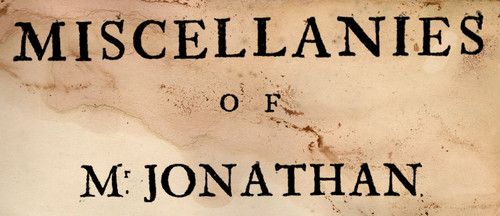
unearths some literary gems.
From "Harlequin and Columbine," by Booth Tarkington:
***
His face was toward the Library, with its two annoyed pet lions.
***
“Tea!” gasped Canby. “People are sick of tea! I didn't write any tea!”
“There isn't any,” said Tinker. “The way he's got it, there's an interruption before the tea comes, and it isn't brought in.”
“But she's ordered it! If it doesn't come the audience will wonder—”
“No,” said Tinker. “They won't think of that. They won't hear her order it.”
“Then for heaven's sake, why has he put it in? I wrote this play to begin right in the story—”
“That's the trouble. They never hear the beginning. They're slamming seats, taking off wraps, looking round to see who's there. That's why we used to begin plays with servants dusting and 'Well-I-never-half-past-nine-and-the-young-master-not-yet-risen!”
***
Tinker came noiselessly down the aisle and resumed his seat beside Canby, who was uttering short, broken sighs, and appeared to have been trying with fair success to give himself a shampoo.
“It's ruined, Mr. Tinker!” he moaned, and his accompanying gesture was misleading, seeming to indicate that he alluded to his hair.
***
Potter stamped the floor; there was wrenched from him an incoherent shriek containing fragments of profane words and ending distinguishably with: “It's that Missmiss again!”
***
She was reputed to walk much among gentles, and to have a high taste in letters and the drama; for she was chief of an essay club, had a hushing manner, and often quoted with precision from reviews, or from such publishers' advertisements as contained no slang; and she was a member of one of the leagues for patronizing the theatre in moderation.
“Mr. Canby,” said the hostess pleasantly, “Miss Cornish wishes to—”
This obtained the attention of the assembly, while Canby, at the other end of the room, sat back in his chair with the unenthusiastic air of a man being served with papers.
“Yes, Miss Cornish.”
Miss Cornish cleared her throat, not practically, but with culture, as preliminary to an address. “I was saying, Mr. Canby,” she began, “that I had a suggestion to make which may not only interest you, but certain others of us who do not enjoy equal opportunities in some matters—as—as others of us who do. Indeed, I believe it will interest all of us without regard to—to—to this. What I was about to suggest was that since today you have had a very interesting experience, not only interesting because you have entered into a professional as well as personal friendship with one of our foremost artists—an artist whose work is cultivated always—but also interesting because there are some of us here whose more practical occupations and walk in life must necessarily withhold them from—from this. What I meant to suggest was that, as this prevents them from—from this—would it not be a favourable opportunity for them to—to glean some commentary upon the actual methods of a field of art? Personally, it happens that whenever opportunities and invitations have been—have been urged, other duties intervened, but though, on that account never having been actually present, I am familiar, of course, through conversation with great artists and memoirs and—and other sources of literature—with the procedure and etiquette of rehearsal. But others among us, no doubt through lack of leisure, are perhaps less so than—than this.”
***
“He writes about theatrical matters,” said Carson Tinker. “Talky-talk writing: 'the drama'—'temperament'—'people of cultivation'—quotes Latin or Italian or something. 'Technique' is his star word; he plays 'technique' for a hand every other line. Doesn't do any harm; in fact, I think he does us a good deal of good. Lots of people read that talky-talk writing nowadays. Not in New York, but in road-towns, where they have plenty of time. This fellow's never against any show much, unless he takes a notion. You slip 'dolsy far nienty' or something about Danty or logarithms somewhere into your play, where it won't delay the action much, and he'll be for you.”
***
“A play isn't something you read; it's something actors do on a stage; and they can't afford to do it unless the public pays to watch 'em. If it won't buy tickets, you haven't got a play; you've only got some typewriting.”
Canby glanced involuntarily at the blue-covered manuscript he had placed upon a table beside him. It had a guilty look.
***
He never interrupted when Potter was speaking; and Canby noticed that whenever Potter talked at any length Tinker looked thoughtful and distant, like a mechanic so accustomed to the whirr and thunder of the machine-shop that he may indulge in reveries there.
***
“You'll see as you get to know him. You won't know him any better than you do now, Mr. Canby; you'll only know him more.”
***
The whole vast cavern of the theatre was as still as the very self of silence.
***



